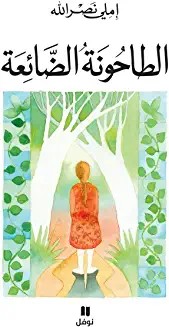
Product Description
Description تتناول رائدة أدب القرية والمهجر إملي نصرالله في هذه المجموعة القصصيّة معاناة الإغتراب والحرب والحنين التي عصفت بالمجتمع اللبناني، وتروي آلام وآمال الصغار والكبار من خلال خواطر ورسائل يكتبونها للأقارب والأحبّة. في 'جبل السندورس' يخاطب عالم الجيولوجيا سامر أمه ويطلب الغفران بعد قضائه سني الغربة طلبًا للعلم، حيث يقع في حبّ امرأة يبني معها عائلة جديدة، قبل أن يدبّ به الحنين الى القرية وحجارة جبل السندورس ذات الموادّ المشتعلة، فيقررّ العودة. الغربة عن الريف لا تلازم من يغادر الوطن فقط بل أيضًا أهل المدينة. في 'الطاحونة الضائعة'، تصطحب الأم القاطنة في المدينة ابنتها الى الضيعة، فتعود بها الذكريات الى طاحونة الضيعة لكنها تكتشف ان الطاحونة اصبحت، كالذكريات، مدفونة في ماضٍ لن يعود. قصصٌ أخرى في المجموعة تروي حكايات الحرب اللبنانيّة والحصار الجسدي والنفسي للصغار القابعين في الملاجىء، والكبار الجالسين خلف الشبابيك المغلقة وقريبًا من خطوط التماس. Biographical note أديبة لبنانية رائدة، عملت في الصحافة، ثمّ غلب عليها الأدب فانصرفت إلى كتابة الرواية والقصّة والسيرة وأدب الفتيان والأطفال. تُرجِم الكثير من كتبها إلى الإنكليزية والألمانية والدانمركية والفنلندية والتايلندية. حصلت على جوائز عديدة منها جائزة الشّاعر سعيد عقل في لبنان وجائزة مجلّة فيروز، وجائزة جبران خليل جبران من رابطة التراث العربيّ في أستراليا، كما نالت عام 2018 وسام الأرز اللبناني عن رتبة كومندور تقديرًا لعطاءاتها الأدبية.-In this collection of short stories, Emily Nasrallah, a pioneer of village and diaspora literature, addresses the suffering of displacement, war, and nostalgia that have affected Lebanese society. She narrates the pains and hopes of both young and old through reflections and letters they write to relatives and loved ones. In "Jabal Al-Sendian," the geology scholar Samer addresses his mother and seeks forgiveness after spending years in exile in pursuit of knowledge. He falls in love with a woman and builds a new family, but eventually, nostalgia for the village and the flammable stones of Jabal Al-Sendian overwhelms him, prompting him to decide to return. The estrangement from the countryside does not only affect those who leave the country but also the city dwellers. In "The Lost Mill," a mother from the city takes her daughter to the estate, and memories resurface about the mill, but she discovers that the mill, like memories, is buried in a past that will not return.With her head bowed, she walked alongside the little girl on the way back, dragging her feet and stumbling in disappointment... And that's why she didn't notice a stone whose letters she despised, emerging from beneath the rubble, obstructing her steps. A choked scream escaped her, and she would have fallen if not for the little girl's supporting arm... In that moment, reality flashed in her eyes like a shattered lightning bolt. She stumbled over the millstone. There she stands atop the ruins of the mill, her precious old mill, buried here under layers of river debris and the passage of years... Other stories in the book tell the tales of the Lebanese war, the physical and psychological siege of children hiding in shelters, and adults sitting behind closed shutters near the frontlines.

